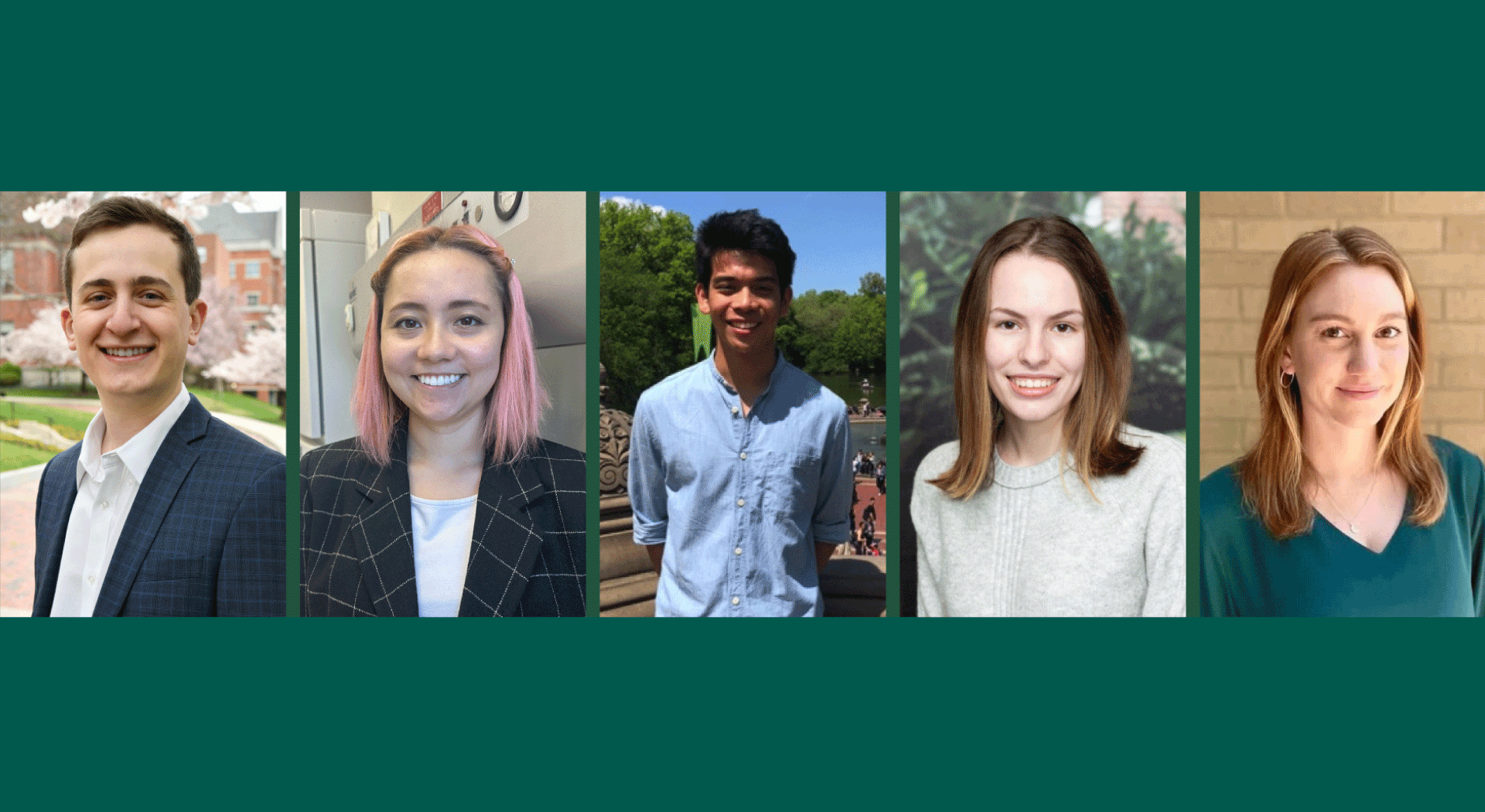
Five Tulanians win NSF-GRFP awards
Three Newcomb-Tulane College alumni, one current undergraduate student and one current graduate student have earned fellowships in the prestigious National Science Foundation Graduate Research Fellowship Program. The Graduate Research Fellowship Program recognizes and supports outstanding students in science, technology, engineering, and mathematics disciplines as they pursue advanced research-based degrees. Fellows benefit from a three-year annual stipend of $34,000 along with a $12,000 cost of education allowance. The GRFP has a long history of selecting recipients who achieve high levels of success in their future academic and professional careers. GRFP recipients become life-long leaders who contribute significantly to both scientific innovation and teaching.
This year’s recipients are:
- Max Kerensky (’21)
- Tia Monjure (’21)
- Eldrick “EM-J” Galang (’22)
- Anna Shattuck (’23)
- Allison Pequet (Tulane PhD Student)

Max Kerensky (’21) is at The Johns Hopkins University School of Medicine, pursuing a Ph.D. in Biomedical Engineering. Kerensky partnered with Hopkins’ Department of Neurosurgery to pioneer biotechnologies to study and advance healthcare for the brain and spinal cord. Upon receiving the GRFP, Kerensky said, “I am deeply honored and excited for this opportunity. Although I am the explicit recipient of the fellowship, the program empowers me to make broader impacts which will greatly benefit others.” When reflecting on his journey to the fellowship, Kerensky said, “I am immeasurably grateful for my family, education, and leaders that paved the way.”
Tia Monjure (’21) is currently a PhD student in Dr. Ana Maria Porras's Tissue-Microbe Interactions Lab. Her research focuses on Leishmaniasis, a parasitic neglected tropical disease that leads to uncontrolled growth of the liver. Her ultimate goal is to engineer a 3D multi-cellular model of the liver to better understand the influence of the parasite on vascular remodeling in this tissue.
Eldrick “EM-J” Galang (’22) is a first-year Cognitive Science Ph.D. student at the University of California San Diego studying under Dr. Douglas Nitz. EM-J uses in vivo electrophysiology to study spatial cognition and navigation by their associated functional cell types in the hippocampus, posterior parietal cortex, and entorhinal cortex. “I am incredibly grateful to the National Science Foundation for the opportunities that this generous award affords, especially in enabling me to further spend my time and energies towards my research” says EM-J. "I have many friends at Tulane to thank as well. Not only for their advising and support in the pursuit of this fellowship, but also their mentorship over the years, including Dr. Paul Colombo, Dr. Dan Burnston, Dr. Katie Black, and Dr. Jennifer Beers.”Please join us in congratulating these exceptional students and wishing them well on their future endeavors!
After graduating from Tulane, Anna Shattuck (’23) will start a PhD in Entomology at Cornell University. She plans to study how changes to the biotic and abiotic environment alter ecological relationships between hosts and parasites, potentially resulting in larger scale effects such as shifts in transmission potential and changes in spatial and temporal distribution of disease. “The NSF GRFP provides me the opportunity to integrate my research interests in disease ecology and math to better understand the effects of climate change on vector-borne disease dynamics. Furthermore, receiving this fellowship gives me the freedom to focus on my research early in my graduate studies. I am incredibly thankful to my many mentors – Dr. Caz Taylor, Dr. Courtney Murdock, Dr. Hannah Frank, Dr. Jennifer Beers, and The Caz Lab – who devoted time and effort into helping me develop into the scientist that I am today.”
The research conducted by Tulane PhD student Allison Pequet investigates how children and young adults are socialized about class by their families, peers and teachers, how social class identity impacts later development in academic and social-emotional domains, and how different identities intersect with social class identity. “As a working-class, first-generation college woman in STEM, my own intersecting identities motivated me to pursue a career in psychological research that centers both meaning-making and awareness of structural barriers to education and well-being. My family is also my primary motivator. My father passed away in May 2022 from a neurodegenerative disorder, and I am driven to honor his memory and become the first in my family to earn a PhD. The NSF GRFP will allow me to pursue these ambitions and more, and validates my decision to pursue a career in research.”
Newcomb-Tulane College offers advising for students and faculty mentors about prestigious scholarships and other post-baccalaureate opportunities. For more information about nationally competitive scholarships and fellowships, contact the Office of Fellowship Advising at FellowshipAdvising@tulane.edu.
